What is the difference between chemical and biological weapons?
1:37
(CNN Spanish) --
Once again, the ghost of chemical weapons reappears in the context of a war, this time between Ukraine and Russia, and while the images of the suffering of civilians under the bombardment with conventional weapons multiply.
This Friday the president of the United States, Joe Bien, said that Russia will pay "a severe price" if it uses chemical weapons in Ukraine.
Russian disinformation is undermining diplomatic efforts to end the war in Ukraine
"I'm not going to talk about the intelligence, but Russia will pay a severe price if it uses chemicals," Biden told CNN's Arlette Saenz, amid the announcement of new sanctions and export controls against Russia as part of the war.
The United States has already sanctioned Russia in the past after determining the use of chemical weapons in the poisoning of Russian opposition leader Alexey Navalny in 2020 and in 2018 against Sergei and Yulia Skripal in England.
How likely is Russia to use chemical weapons?
1:49
Although there is currently no evidence that they have been used in Ukraine, the background of Navalny and Skripal, and the 2017 chemical weapons attack by Bashar al-Assad in Syria, whose regime is supported by Russia, have raised suspicions.
advertising
What are chemical weapons?
The Organization for the Prohibition of Chemical Weapons (OPCW), which has broad international support, defines them as "a chemical that is used to intentionally cause harm or death through its toxic properties."
"The definition of a chemical weapon also includes ammunition, devices and other equipment specifically designed to weaponize toxic chemicals," the OPCW adds on its website.
Some of the main substances that have been used as chemical weapons are chlorine —asphyxiating—, mustard gas —which produces painful blisters all over the body—, and neurotoxic agents such as sarin, VX and Novichok —which produce paralysis and death-.
What are potassium iodide tablets and what are they for?
Do they work against radiation?
How are they different from biological ones?
Chemical and biological weapons, along with nuclear weapons, are part of the group of weapons of mass destruction.
Is it possible to defend against an attack with chemical weapons?
0:41
But unlike chemical weapons, which use harmful and potentially lethal substances, biological weapons are based on the use of "pathogenic organisms or toxins to harm or kill people, animals or plants," according to the UN.
"They typically consist of two parts: a weaponized agent and a delivery mechanism. In addition to strategic or tactical military applications, biological weapons can be used for political assassination, infection of livestock or agricultural products to cause food shortages and economic losses, the creation of environmental catastrophes and the introduction of widespread disease, fear and mistrust among the public.
Biological weapons use bacteria, viruses and fungi, as well as toxins found in nature, to cause damage, highlights the WHO.
Some of the main agents that have been used are anthrax, botulinum toxin and plague, and potentially viruses such as Ebola could also be used.
What is Russia's capacity in the use of chemical weapons?
1:11
Why are they prohibited?
Chemical and biological weapons were first banned in a protocol signed in 1925, after the First World War, when chemical agents such as chlorine and mustard gas were widely used on the battlefield, with devastating results that terrified people. the international community.
"Whereas the use in war of asphyxiating, poisonous, or other gases, and of all analogous liquids, materials, or devices, has been justly condemned by the general opinion of the civilized world," says the 1925 protocol.
Johnny Nehme, an expert from the International Committee of the Red Cross, highlights that the prohibition of these weapons is due to the fact that they are "indiscriminate", potentially affecting people who participate or not in the conflict, and that they generate lifelong damage and effects after the end of the conflict. the conflict.
Then the 1975 Convention on the Prohibition of the Development, Production and Stockpiling of Bacteriological Weapons, and the Convention on the Prohibition of the Development, Production, Stockpiling and Use of Chemical Weapons and on their Destruction—from which the OPCW stems. —, of 1997, ratified the status of these weapons.
Russia is a signatory to both conventions, as is the United States.
Chemical weaponsWar in Ukraine

